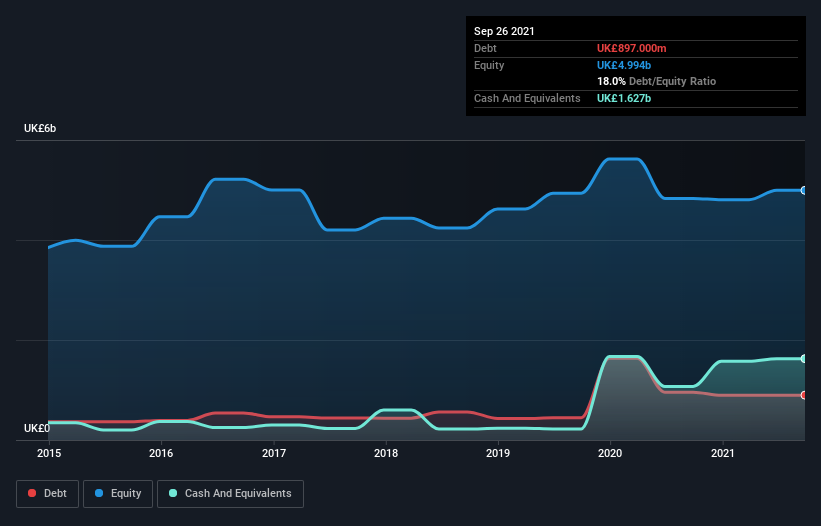Warren Buffett famously said, 'Volatility is far from synonymous with risk.' When we think about how risky a company is, we always like to look at its use of debt, since debt overload can lead to ruin. Importantly, Royal Mail plc (LON:RMG) does carry debt. But the more important question is: how much risk is that debt creating?
When Is Debt Dangerous?
Generally speaking, debt only becomes a real problem when a company can't easily pay it off, either by raising capital or with its own cash flow. Ultimately, if the company can't fulfill its legal obligations to repay debt, shareholders could walk away with nothing. While that is not too common, we often do see indebted companies permanently diluting shareholders because lenders force them to raise capital at a distressed price. Of course, debt can be an important tool in businesses, particularly capital heavy businesses. When we examine debt levels, we first consider both cash and debt levels, together.
See our latest analysis for Royal Mail
What Is Royal Mail's Net Debt?
You can click the graphic below for the historical numbers, but it shows that Royal Mail had UK£897.0m of debt in September 2021, down from UK£957.0m, one year before. But it also has UK£1.63b in cash to offset that, meaning it has UK£730.0m net cash.

How Healthy Is Royal Mail's Balance Sheet?
Zooming in on the latest balance sheet data, we can see that Royal Mail had liabilities of UK£2.48b due within 12 months and liabilities of UK£2.69b due beyond that. On the other hand, it had cash of UK£1.63b and UK£1.56b worth of receivables due within a year. So its liabilities total UK£1.99b more than the combination of its cash and short-term receivables.
While this might seem like a lot, it is not so bad since Royal Mail has a market capitalization of UK£4.88b, and so it could probably strengthen its balance sheet by raising capital if it needed to. But it's clear that we should definitely closely examine whether it can manage its debt without dilution. Despite its noteworthy liabilities, Royal Mail boasts net cash, so it's fair to say it does not have a heavy debt load!
Even more impressive was the fact that Royal Mail grew its EBIT by 105% over twelve months. If maintained that growth will make the debt even more manageable in the years ahead. There's no doubt that we learn most about debt from the balance sheet. But ultimately the future profitability of the business will decide if Royal Mail can strengthen its balance sheet over time. So if you're focused on the future you can check out this free report showing analyst profit forecasts.
Finally, a company can only pay off debt with cold hard cash, not accounting profits. While Royal Mail has net cash on its balance sheet, it's still worth taking a look at its ability to convert earnings before interest and tax (EBIT) to free cash flow, to help us understand how quickly it is building (or eroding) that cash balance. During the last three years, Royal Mail generated free cash flow amounting to a very robust 97% of its EBIT, more than we'd expect. That puts it in a very strong position to pay down debt.
Summing up
Although Royal Mail's balance sheet isn't particularly strong, due to the total liabilities, it is clearly positive to see that it has net cash of UK£730.0m. The cherry on top was that in converted 97% of that EBIT to free cash flow, bringing in UK£888m. So is Royal Mail's debt a risk? It doesn't seem so to us. The balance sheet is clearly the area to focus on when you are analysing debt. However, not all investment risk resides within the balance sheet - far from it. To that end, you should learn about the 2 warning signs we've spotted with Royal Mail (including 1 which shouldn't be ignored) .
If, after all that, you're more interested in a fast growing company with a rock-solid balance sheet, then check out our list of net cash growth stocks without delay.
New: AI Stock Screener & Alerts
Our new AI Stock Screener scans the market every day to uncover opportunities.
• Dividend Powerhouses (3%+ Yield)
• Undervalued Small Caps with Insider Buying
• High growth Tech and AI Companies
Or build your own from over 50 metrics.
Have feedback on this article? Concerned about the content? Get in touch with us directly. Alternatively, email editorial-team (at) simplywallst.com.
This article by Simply Wall St is general in nature. We provide commentary based on historical data and analyst forecasts only using an unbiased methodology and our articles are not intended to be financial advice. It does not constitute a recommendation to buy or sell any stock, and does not take account of your objectives, or your financial situation. We aim to bring you long-term focused analysis driven by fundamental data. Note that our analysis may not factor in the latest price-sensitive company announcements or qualitative material. Simply Wall St has no position in any stocks mentioned.
About LSE:IDS
International Distribution Services
Operates as a universal postal service provider in the United Kingdom and internationally.
Good value with adequate balance sheet.
Similar Companies
Market Insights
Community Narratives



